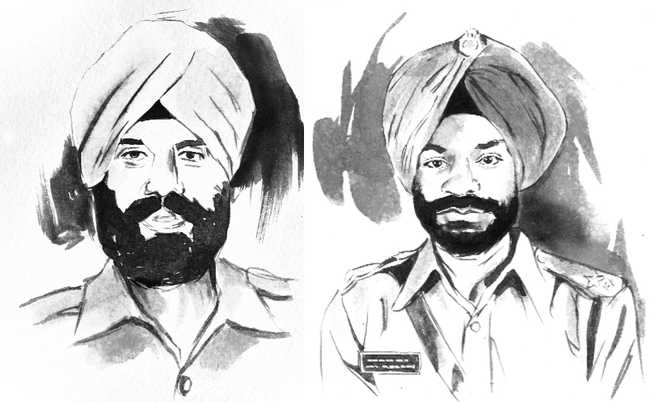
Avinder Brar was an extraordinary officer, ram-rod straight in his physical appearance and also, more importantly, in his dealings. ; Assassins in track suits targeted Avinder and his junior, KRS Gill, in Patiala when they were out on a morning jog. Illustrations: Sandeep Joshi
Julio Ribeiro
IF I had not selected Avinder Brar to keep me safe and alive, he would have gone on to command Punjab Police sooner or later. This was one big “if” that might have decided the course an outstanding officer’s life would take. As I wrote in an earlier article, history is replete with ifs and buts.
When he was shot dead by terrorists in the Patiala sports complex, his brother-in-law, a serving Army officer, and the father-in-law of the other IPS officer killed along with Avinder accused me of leading young Sikh youth to perdition! I gave them no reply because I knew in my bones that they and other near relatives were emotionally upset. But reflecting on the circumstances later in life, I had to admit to my own role in Avinder’s early departure from the world! That event was never visualised, I can say with certainty in my defence.
A day before he was killed along with another young Jat Sikh IPS officer, Avinder had sent word to me through a messenger that assassins in track suits would mingle with other police sportspersons in Jalandhar’s armed police complex to shoot me. I was slated to select our police hockey and athletics team that day and in the course of the exercise I could have become a sitting duck.
I alerted my security cordon and completed my task without any extra sweat, but alas the same or some other assassins in track suits targeted dear Avinder and his junior, KRS Gill, near the National Institute of Sports when they were out on a morning jog. Avinder had got the right information through his contacts but the targets were obviously different!
In one fell swoop, I had lost two young officers of promise. Avinder was an extraordinary officer, ram-rod straight in his physical appearance and also, more importantly, in his dealings, official and personal. He was a licenced pilot of
small aircraft and a swimmer who had represented India at international competitions.
Besides his proven capabilities, Avinder was the scion of one of Punjab’s landed families. He wore this fact very lightly on his sleeves. He once told me that his father was a minor politician and had dabbled in agro-related businesses but he never mentioned that the family owned vast acres of land that often turned young heirs of such fortunes into playboys.
But Avinder was made of sterner stuff. He was a product of St Stephen’s College, Delhi, where his interest in public service was inculcated. His only other sibling was a sister, who was given employment in the Central Reserve Police Force as compensation for her brother’s sacrifice. It is sad that she later got involved in a dispute with her late brother’s family.
Fixation for land
Land is a fixation for scores of Punjab’s landed aristocracy and others who aspire to that status. Land-grabbing is a common pastime. Murders and crime motivated by land disputes, a common occurrence. In Goa, the state where my ancestors lived for a millennia or more, I did not hear of murders or other violent forms of crime though I did learn of family disputes lasting several decades, of cousins not speaking to each other literally since they were born.
There is one marked difference though that defines the landed families of Punjab and Goa. The Punjabi ethos puts a lot of importance on material possessions. The richer the family, the more powerful and arrogant it becomes. In Goa, the laid-back ‘bhatkars’ or landowners have lost most of their land to the ‘mundkars’ or landless labour that stayed permanently on that land and cultivated it for the owners. Riches did not matter to the Goan Christian Brahmins and Kshatriya communities. It was achievements in the literary or professional field and intellectual acumen that marked the family for prominence.
Avinder would have been a jewel, a shining light in the Goan Christian society of the era gone by. I presume things have changed in the land of my ancestors as things are bound to change with the advent of freedom and democracy. With ‘one man, one vote’, the majority Hindus and the less educated castes among the Christians have come into their own. In colonial times, the upper caste Christians were favoured by the rulers.
I mention this only because the one I loved and admired, hailing from Punjab’s elite class, laid down his life for his friends!
Next week: Who invented
‘bullet for bullet’?



























